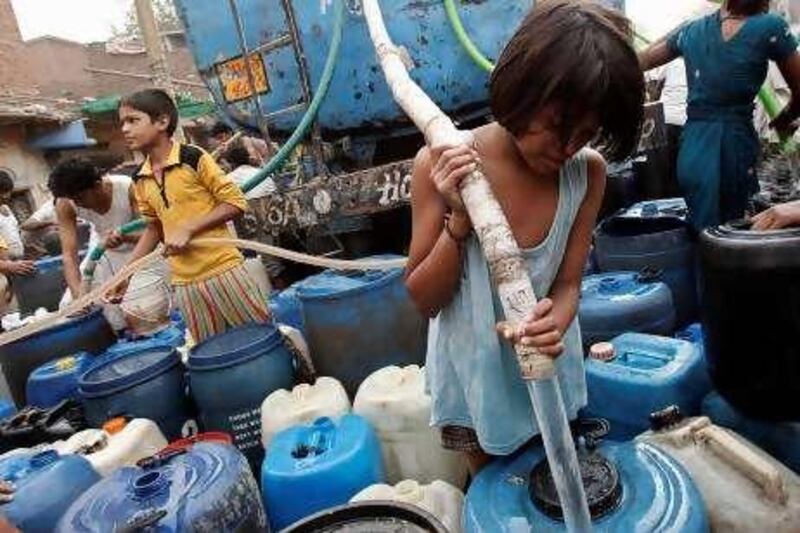NEW YORK // The task is simple, but daunting: devise a way for mankind to have enough food, water and energy and lift the worst-off out of poverty without overstretching our strained planet.
Sheikh Abdullah bin Zayed, the UAE Foreign Minister, and 20 other leaders from governments and the private sector have little more than a year to come up with the answer. They were appointed by the UN secretary general, Ban Ki-moon, last month and had their first meeting on Sunday night as 140 heads of state and government gathered for the annual General Assembly. Calling for "vision and fresh thinking", the UN chief warned that the global population will reach nine billion by 2050 - the year by which emissions of heat-trapping gases must be cut by half to avert the threats from climate change.
"I encouraged panel members to think big, to connect the dots between poverty, energy and food, water, environmental pressure and climate change. I asked them to draft a bold but practical blueprint for how countries can develop in a sustainable manner," Mr Ban said. Panellists will offer ideas for sustainable living and report back by the end of next year, feeding in to the negotiations towards a global climate-change treaty and before a UN development meeting in Brazil in 2012.
The panel met at the start of a week of high-level meetings at UN headquarters in Manhattan, with a three-day summit on a set of eight anti-poverty targets - the Millennium Development Goals - due to be followed by the UN General Assembly. UN officials fear that the efforts to tackle poverty, disease and inequality, agreed upon in 2000, will fail to meet their targets by the 2015 deadline, and have urged wealthy nations to fulfil their cash pledges.
Sheikh Abdullah was accompanied at the panel's inaugural meeting by Dr Sultan al Jaber, chief executive of Masdar in Abu Dhabi, the world's first planned carbon-neutral city. Dr al Jaber said the UAE was uniquely equipped with technology and data about climate change and could contribute greatly to the UN action plan. Abu Dhabi hosts the International Renewable Energy Agency and Masdar City, a zero-waste and carbon-neutral development on the outskirts of the capital that researchers hope will become a model for urban development. "The establishment of Masdar, a comprehensive, ambitious and progressive initiative, is in many ways acting as a catalyst in addressing the issue of global sustainability," said Dr al Jaber. "Masdar, through its multifaceted approach, addresses the entire value chain of renewable energy, including education, research and development, investment and technology commercialisation. "Our integrated experience and knowledge across these areas is helpful to discussions focused around the challenges of global sustainable development, especially on issues related to clean energy, which is crucial to any solution." The UN chief urged panellists to "think big, to be bold and also practical" and devise an action plan to counter the threats from climate change, biodiversity loss, and shortages of food and water. The High-Level Panel on Global Sustainability, as it is known, is jointly chaired by the presidents of South Africa and Finland, Jacob Zuma and Tarja Halonen, with members co-ordinating through a secretariat in New York and holding three in-person meetings. "The green economy will require big changes in the way the world does business, changes in our production and consumption patterns and also in national and international decision-making," said Ms Halonen. "We do not promise to make a miracle, but we are very committed to our work and we think that we can help the United Nations." The group consists of politicians, policymakers and businessmen, including Jairam Ramesh, India's environment minister; James Balsillie, the joint chief executive of Canada's Research in Motion, the maker of BlackBerry devices; the former Japanese prime minister Yukio Hatoyama; and the former Norwegian prime minister, Gro Harlem Brundtland, who chaired a 1980s UN study on sustainable development that produced a landmark report, Our Common Future. jreinl@thenational.ae







